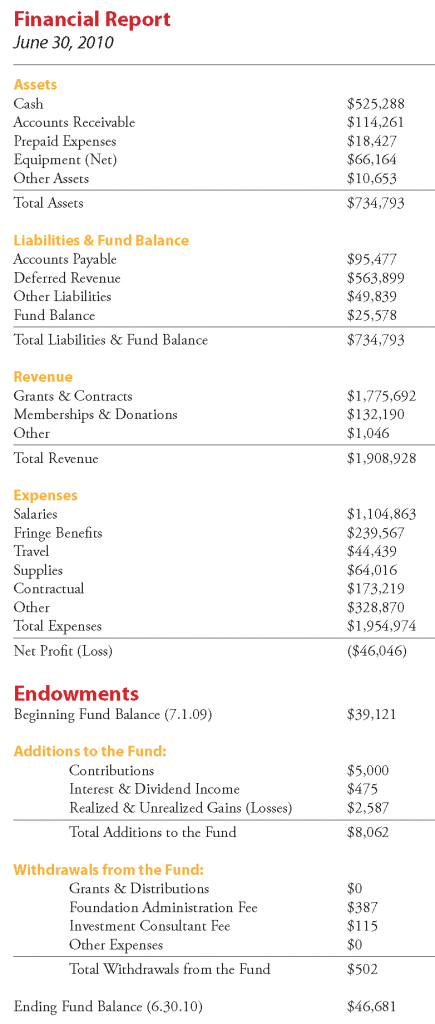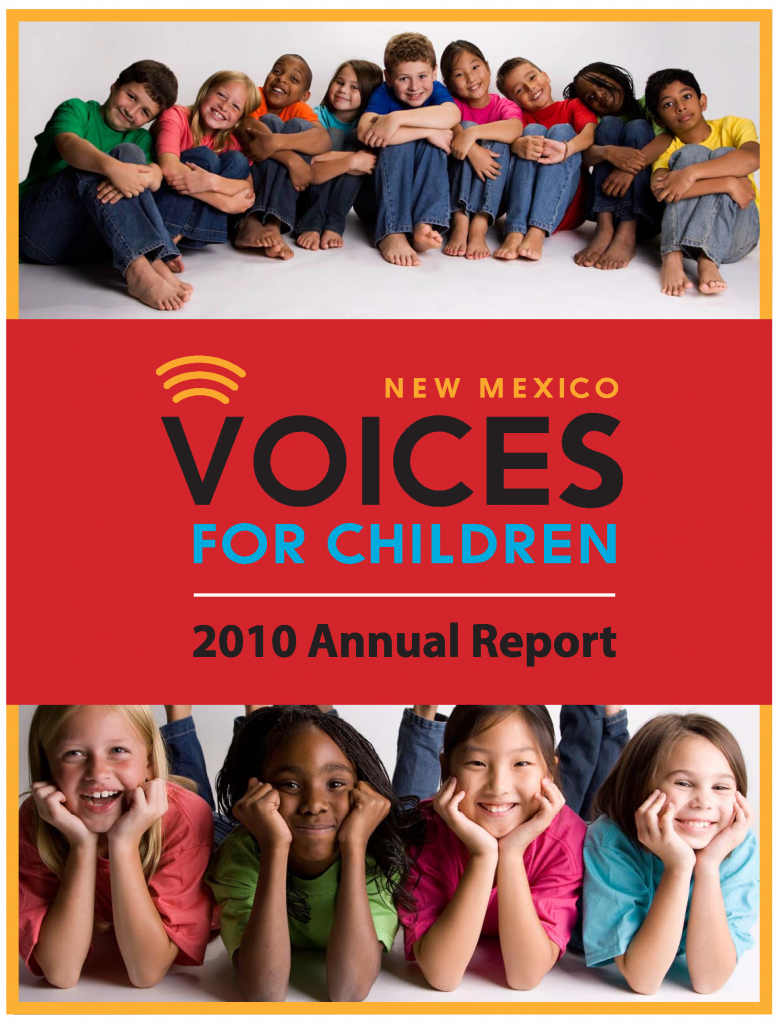Download the full report (Sept. 2011; 16 pages; pdf)
 The Year in Review
The Year in Review
Our 2010 fiscal year, beginning July 1, 2009, was a particularly challenging one for our state advocacy work in terms of fiscal policy. The Great Recession was hitting New Mexico hard and in September the Legislature was called into a special session to patch a growing hole in the state’s bank account. The overwhelming legislative reaction was to cut spending, but we believe (as do many economists) that a cuts-only approach to the revenue shortfall would actually make the recession worse and weaken New Mexico’s ability to recover. Moreover, economic down times are when working families—especially those that are already economically vulnerable—need supports such as Medicaid, unemployment insurance, and food stamps the most. Indeed, as the year played out, record numbers of families applied to these programs, as growing unemployment led to the loss of income and employer-provided health insurance.
It was during this time that we organized and led a coalition of small business organizations, faith leaders, and labor and advocacy groups called Better Choices New Mexico. The focus of this group was to inform the public dialog around the budget shortfall, advocate against deep and damaging cuts to critical state programs like education, health care, and public safety, and educate the public and policymakers about other options. This educational campaign was accomplished via the release of several fact sheets and publications and a 20-day public relations campaign that highlighted 20 ways in which budget cuts would harm New Mexicans. While we were unable to change the course of the special session, our calls for a “balanced approach” to solving the state budget crisis did impact the public debate around including revenue increases as part of the discussion. By the 2010 session, revenue increases were considered “inevitable.”
In November of 2009, our Policy Director, Bill Jordan, was named to the Governor’s budget balancing task force. While the group came to many of the same conclusions that we had about the best ways to raise revenue in a recession, few of those recommendations survived when the Legislature convened in January.
One of the revenue-raising options that the task force brought up and the Legislature passed—but which we fought against—was to tax food. As you may recall, the Legislature had made groceries exempt from the gross receipts tax (New Mexico’s version of the sales tax) in 2005. We had also opposed that move because that particular legislation also raised the gross receipts tax rate on other purchases. Broad-based sales taxes—like the tax on food—impacts lower-income families the hardest because they must spend all of their income on day-to-day necessities, which are subject to sales taxes. Higher income families, on the other hand, are more likely to be able to set aside some of their income in a savings account. While the Legislature voted to reinstate the tax on food, Governor Richardson vetoed the bill.
Two revenue-raising bills that we advocated on behalf of did pass—the closure of a state income tax loophole that mainly benefitted high-income New Mexicans, and a 75-cent-per-pack increase on cigarettes. While tobacco taxes do tend to fall more heavily on lower-income families, such tax increases discourage teens from starting to smoke and encourages some adults to quit. Unfortunately, we lost our fight to increase funding for the state’s child care assistance program, which helps struggling families provide higher quality child care than they could otherwise afford.
We also worked during that session to advocate against cuts to programs that serve young children, such as child care assistance and pre-kindergarten. For this work we led the group Birth to Five New Mexico with support from the Birth to Five Policy Alliance and the McCune Charitable Foundation. Although this was a much smaller effort than leading the Better Choices alliance, we were successful in educating lawmakers about the importance of a child’s early years to their later success, and in raising the visibility of ECE programs.
Shortly after the 2010 legislative session, we received a large, multi-year grant from the W.K. Kellogg Foundation to greatly extend our work around ECE issues. The project—called Voices for the Future—centers on creating a paradigm shift in public attitudes toward education. Since learning begins at birth, we believe our public investment in education should start then too. All young children should have access to high-quality ECE programs before they enter kindergarten. Such programs—particularly when they are aligned as a continuum that integrates with the first three years of grade school—can virtually transform our K-12 system simply by ensuring that children start school with the social, emotional and cognitive skills they need to succeed.
Numerous studies have shown that children who are behind when they start school do not catch up. What’s worse, the achievement gap between these children and their peers continues to grow as children progress toward high school. Children from low-income families that do not have the resources to provide nurturing early development experiences, such as high-quality child care, are most at risk for being behind when they enter school. Our work under the Kellogg grant has tried to highlight some of these disparities for policymakers.
In March of 2010, much of our hard work around affordable and universal health care was rewarded when Congress passed the Patient Protection and Affordable Care Act. Although this landmark federal reform is far from perfect, its passage marked an important first step toward providing health care to every American.
Our 2010 fiscal year ended on a very sad note. In late June the advocacy world lost an extraordinary champion when Polly Arango was killed in an accident. Polly had been a long-time member of our Board of Directors, but her advocacy circle went far beyond NM Voices. As a co-founder of two organizations, Family Voices and Parents Reaching Out, Polly was a fierce advocate for families with children who have disabilities. In fact, she worked closely with another New Mexico advocate who died much too young—Patty Jennings—to create state laws to guarantee that children with disabilities have the same opportunities as children without. She was instrumental in advancing the concept of supporting families in ways that allowed them to keep their children at home instead of in institutions. Although Polly was passionate about the broader scope of work we tackle at NM Voices, she could always be counted on to remind us about parity for children with disabilities. She is greatly missed.

Reports and Publications
We released two reports through our Fiscal Policy Project—New Mexico’s Economy and the Recovery Act of 2009, which took a look at exactly how New Mexicans were benefiting from the federal stimulus bill that was passed in early 2009, and The Great Recession: How New Mexico Workers are Faring, which looked at how the recession hit some employment sectors harder than others. Through our Better Choices campaign, we released numerous fact sheets detailing the damage a cuts-only approach to the budget deficit would do and explaining the benefits of a number of revenue options. We also released our annual New Mexico KIDS COUNT data book in early 2010 with the support of the Annie E. Casey Foundation.
As usual, we also helped several of our national partners with the release of their reports, including the Annie E. Casey Foundation’s Early Warning! Why Reading by the End of Third Grade Matters, which heralded the bad news that just 20 percent of New Mexico’s fourth graders are reading proficiently.
Special Events
We held our first Spirit of Hope Celebration in October of 2009, where we honored the community service work of New Mexicans by bestowing the First Annual Alice King Public Service Award, First Annual Patty Jennings Citizen Advocacy Award, and the 16th Annual Amy Biehl Youth Spirit Award. New Mexico Supreme Court Justice Petra Jimenez-Maes received the Alice King Award and Angie Vachio, a long-time children’s advocate and founder of PB&J therapeutic preschool, received the Patty Jennings Award. The winners of the Amy Biehl Youth Spirit Award were Alejandra Carbona of Albuquerque and Fionna Walters of Mexican Springs. Alex Wirth of Santa Fe and Arielle Hawney of Sapello were the second place honorees.
Our Youth Link program held its first ever statewide Youth Leadership and Advocacy Conference in February of 2010, at which some 250 middle- and high-school aged youths from across the state learned leadership and anti-tobacco presentation skills. Youth Link also hosted their Sixth Annual Fame & Shame Awards in May 2010 to honor 20 middle- and high-school aged youths nominated for the Youth Advocate of the Year Awards. Unfortunately, due to the state’s budget shortfall, our Youth Link funding ended just as our fiscal year did—on June 30, 2010. In future, we will look for other opportunities to engage New Mexico youth to advocate for policies that impact their lives.
Download the full report (Sept. 2011; 16 pages; pdf)

